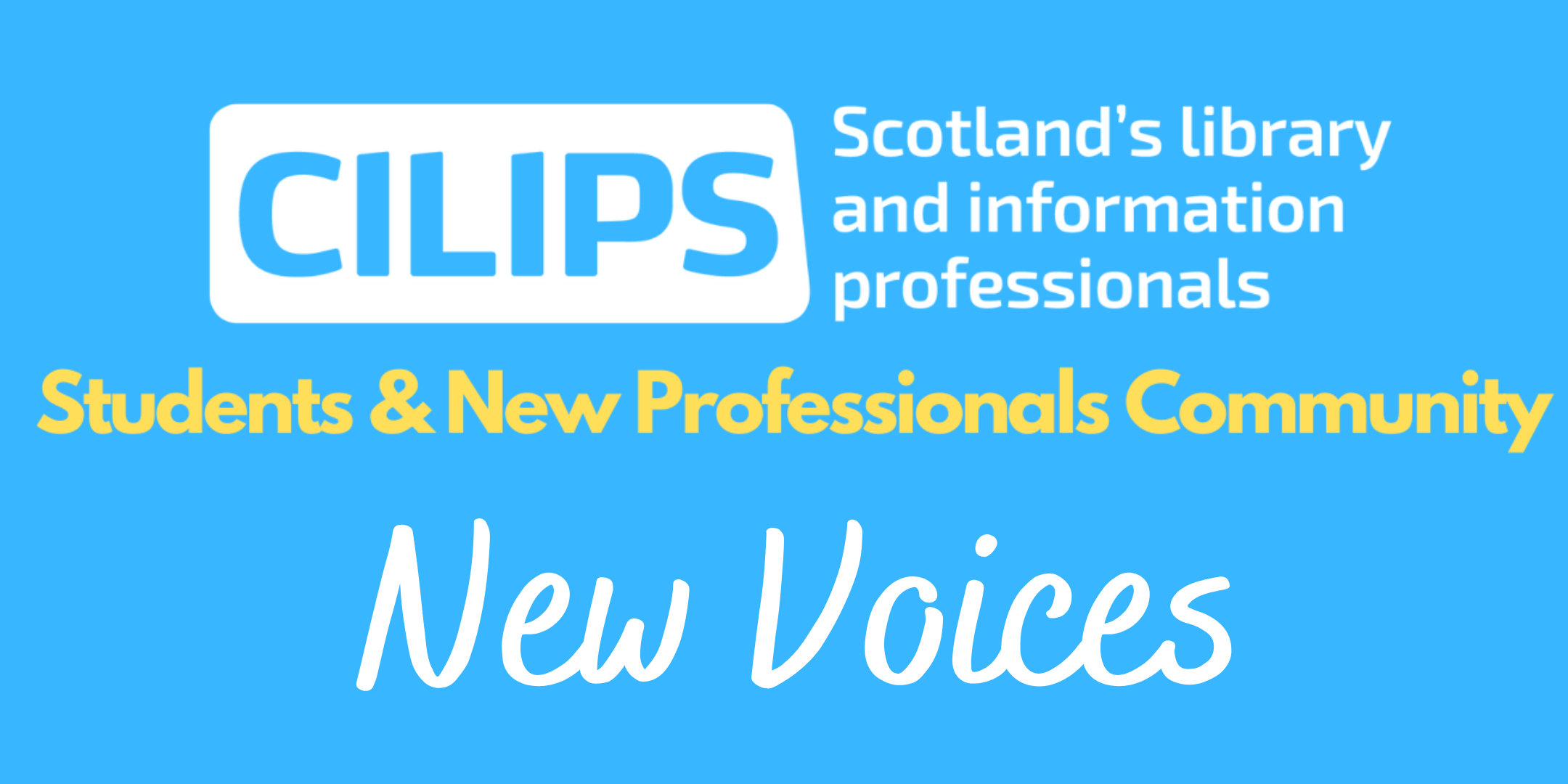New Voices RGU Student Series 2023– Jimi Mitchell
Category: New Voices, New Voices, News, RGU Student Series

In this 2023 Student Series for the New Voices blog, the CILIPS Students & New Professionals Community will be sharing the views of Robert Gordon University students from the MSc in Information and Library Studies. With special thanks to Dr Konstantina Martzoukou, Teaching Excellence Fellow and Associate Professor, for organising these fantastic contributions. This series will be shared by CILIPS Graduate Trainee Leah Higgins.
 We are delighted to open the 2023 series of ‘New Voices’ blogs with an exploration into how library and information professionals can support refugees in both public and academic contexts. Author Jimi Mitchell (@asinhendrix) is a senior Library Administrator at Glasgow Caledonian University responsible for the Library Information Support Team. He is passionate about the role of libraries within the community and providing fair and open access to resources. In his spare time he helps run a community arts organisation devoted to musical theatre.
We are delighted to open the 2023 series of ‘New Voices’ blogs with an exploration into how library and information professionals can support refugees in both public and academic contexts. Author Jimi Mitchell (@asinhendrix) is a senior Library Administrator at Glasgow Caledonian University responsible for the Library Information Support Team. He is passionate about the role of libraries within the community and providing fair and open access to resources. In his spare time he helps run a community arts organisation devoted to musical theatre.
Photo credit of Jimi www.mihaelabodlovic.co.uk/
Breaking down barriers to help others: how information professionals in public and academic libraries can work together to support refugees
Since the outbreak of the war in Ukraine ten months ago the UK has welcomed just under 150,000 Ukrainians to its shores under the Family and Homes for Ukraine schemes, the latter seeing generous volunteers offering up their homes (Home Office 2022). However, with no clear sign of the war abating and increased desires to lead a more independent lifestyle this warm welcome is beginning to feel a strain with some 2,175 Ukrainians presenting as homeless by the end of October 2022 (Wallis 2022). Beyond supporting the basic needs of refugee families, for them to pursue a lifestyle that even remotely resembles that of the one they had back home their information literacy needs must also be addressed if they are to pursue education, employment and medical support as illustrated in Figure 1 (Sorochuk, Ivanova and Reina 2022).

Figure 1 – Graph showing information literacy needs of Ukrainian refugees aged 14 – 35 (Sorochuk, Ivanova and Reina 2022).
Information literacy is a vital source of confidence and empowerment as an everyday citizen as it allows us to “make balanced judgements about any information we find and use” (CILIP 2018). Public librarians are crucial in supporting individuals in an everyday context. They are responsible for catering to the vast information literacy requirements of the general public, including refugees. It is in public libraries where individuals can get support with digital literacy and navigating the plethora of information available on the internet, as well as free access to computers, printers and most importantly, interpersonal communication (Case and Given 2016). As information professionals, public librarians can play such a key role in the lives of refugees.
However, in the UK public libraries are facing their own series of strains. With an era of austerity ushered in by the Government, as of 2019 some 800 public libraries have been closed and public librarians are facing job losses in their thousands with many more feeling the burden of budget cuts as spending has been reduced by almost a quarter (Flood 2019; Walton 2021). Yet in the ensuing cost of living crisis, information professionals in public libraries have become the “beating heart of their communities” with librarians and library assistants expanding their roles to support the homeless and refugees (The Guardian 2022).
With the sheer amount of pressure on public librarians’ shoulders it is the responsibility of their fellow information professionals to support them however they can so that those seeking vital information are able to do so. Their neighbours in academic institutions might be best suited for this role. Bowdoin et al. (2017) illustrate numerous instances of academic libraries supporting refugees from a research and archival standpoint however the evidence is clear that when academic librarians collaborate with their public counterparts it is of greater benefit to the everyday lives of the communities they serve, such as with the Engaging Libraries project (Pekacar 2022).
Martzoukou (2020) highlights a successful case study from Aberdeenshire Libraries where young volunteers were selected from the group of Syrian new Scots the library was working with to help with ICT classes. This could easily be expanded upon by engaging ESOL students at local universities to work alongside the refugee volunteers and could provide career development for both parties. Furthermore, Glasgow Caledonian University has developed a wellbeing space to facilitate its mission as the University for the Common Good where, as a public building, all its events are open to the wider community for free.
Refugee support charity, the Darfur Foundation, is already taking advantage of their language classes and reading groups, and the space can accommodate longer opening hours than its local public counterparts therefore providing an extra space (Smith 2022).
It has never been more important for us to come together as a community to support others in need. Information professionals in both public and academic libraries are in a prime position to support with this but first need to break down their barriers and show that same sense of community spirit that keeps us thriving.
Thank you to Jimi for this topical investigation into how information professionals and academic libraries can work in harmony to break down barriers and support refugees.
Stay tuned for more in the 2023 New Voices Student Series coming soon and be sure to check out the rest of CILIPS SNPC’s New Voices blog.
Bibliography
BOWDOIN, N.T. et al., 2017. Academic libraries serving refugees and asylum seekers. College and Research Libraries News, 78(6), pp. 298-337.
CASE, D.O. and GIVEN, L.M., 2016. Research by Roles and Contexts. In: D.O. CASE and L.M. GIVEN, eds. Looking for Information: A Survey of Research on Information Seeking, Needs and Behavior. Bingley, UK: Emerald Group Publishing Limited. pp. 343-345.
CILIP, 2018. CILIP Definition of Information Literacy 2018. Available at: https://infolit.org.uk/ILdefinitionCILIP2018.pdf [Accessed 24/11/2022].
FLOOD, A., 2019. Britain has closed almost 800 libraries since 2010, figures show. The Guardian, 6 December. Available at: https://www.theguardian.com/books/2019/dec/06/britain-has-closed-almost800-libraries-since-2010-figures-show [Accessed 24/11/ 2022]
HOME OFFICE, 2022. Statistics on Ukrainians in the UK. [online]. Available from: https://www.gov.uk/government/statistics/immigration-statistics-year-endingseptember-2022/statistics-on-ukrainians-in-the-uk [Accessed 25/11/ 2022].
MARTZOUKOU, K., 2020. Scottish public libraries welcome Syrian new Scots: a transition from being a refugee to becoming an active part of the community. In: S. GOLDSTEIN, ed. Informed Societies. Facet Publishing. pp. 181-207.
PEKACAR, K., 2022. A perfect marriage? Universities and public libraries working in partnership on community and public engagement. [online]. Available from: https://www.publicengagement.ac.uk/whats-new/blog/universities-and-publiclibraries-working-in-partnership [Accessed 26/11/ 2022].
SMITH, J., 2022. Creating a Wellbeing space within the Sir Alex Ferguson Library: Glasgow Caledonian University. [online]. Available from: https://www.cilips.org.uk/relax-and-renew/ [Accessed 24/11/ 2022].
SOROCHUK, M., IVANOVA, T. and REINA, E., 2022. Ukrainian displaced youth: Identifying information needs and aspirations – A SURVEY REPORT. Luxembourg: 6 ERYICA (European Youth Information And Counselling Agency). Available at: https://rm.coe.int/eryica-young-refugees-ukraine-report/1680a8625d [Accessed 24/11/2022].
THE GUARDIAN, 2022. The Guardian view on local libraries: a resource that must be protected. The Guardian, 4 December [Accessed 05/12/ 2022].
WALLIS, W., 2022. English councils struggle to maintain Ukraine refugee scheme as war drags on. Financial Times, 4 December [Accessed 05/12/ 2022].
WALTON, A., 2021. The Quiet Disappearance of Britain’s Public Libraries. [online]. Available from: https://tribunemag.co.uk/2021/01/the-quietdisappearance-of-britains-publiclibraries#:~:text=Public%20spending%20cuts%20have%20closed,led%20by%2 0the%20Tory%20government. [Accessed 23/11/ 2022].